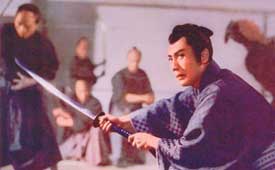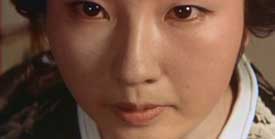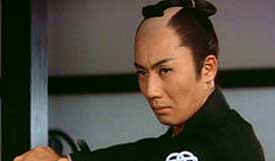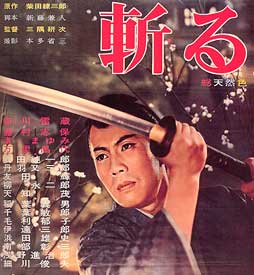 The script for Destiny's Son (Kiru, Daiei, 1962) is by leftist director & screenwriter Kaneto Shindo, whose own best known film is Onibaba (1964). The script for Destiny's Son (Kiru, Daiei, 1962) is by leftist director & screenwriter Kaneto Shindo, whose own best known film is Onibaba (1964).
Direction is by Kenji Misumi whose work on the Zatoichi & Full Moon Swordsman series, among so much else, has made him a legend among chambara of samurai swordplay films. Destiny's Son is based on a novel by Shibata Renzaburo, who also created the Full Moon Swordsman.
The film opens with a Shiho Fujimura playing a woman assassin, who kills her lord's evil mistress for the sake of the clan, & eventually pays the punishment of being beheaded by the man who loved her (Shigeru Amachi). That man becomes a monk & sends his infant son to be fostered in another family.
 The film follows the adventures of the young master swordsman (Raizo Ichikawa) this child grew up to be. The film follows the adventures of the young master swordsman (Raizo Ichikawa) this child grew up to be.
Few know his origins which has been kept secret even from him. As a young man of twenty he sets out on a three year foot-journey of knight errantry in order to see the world & grow as a samurai. He returns home having developed an undefeatable sword posture -- a throat-piercing stance that could be defeated only by an oponent willing to die in the same stroke.
His skills gain him immediate attention, but jealousies & betrayals cause him to lose his family to assassins. His foster father upon last breath reveals to him the secret of his birth. The young man avenges his foster family then sets off to meet the monk who beheaded his mother.
 Rather than a single cohesive plot, we are shown a series of adventures that reveal bits of the hero's nature, each episodic event including swordplay action. Rather than a single cohesive plot, we are shown a series of adventures that reveal bits of the hero's nature, each episodic event including swordplay action.
The gorgeous widescreen color cinematography, costumes, countryside, hairstyles, sets, are all extremely beautiful. If anything the film is a bit too tidy in its careful presentation; no one ever gets dirty or has a hair misplaced.
Raizo was one of the most serious jidai geki actors & creates a convincing character portrait. Although the story glamorizes the samurai world, the scriptwriter was in fact a peasant whose criticism of the class system informs all his films. And it is no accident that the most decent characters in this chain of events cannot be expected to survive, the often-glamorized system being inherently harmful & unjust.
copyright © by Paghat the Ratgirl
|

